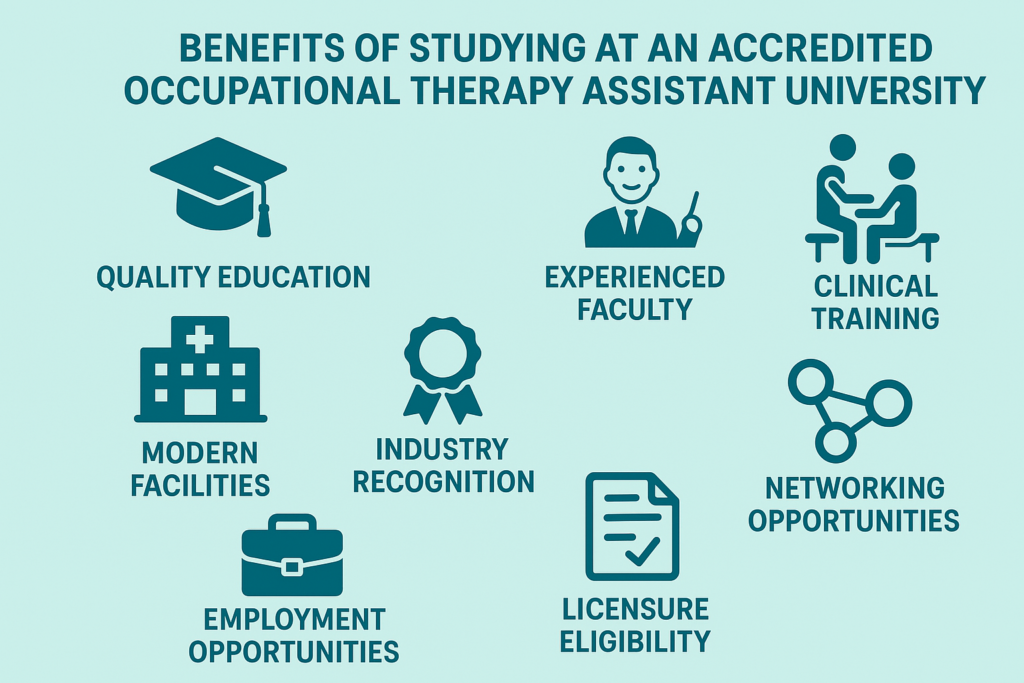Choosing an occupational therapy assistant university is one of the smartest moves for anyone passionate about making a difference in people’s lives.
It’s a role that blends hands-on care with real results—especially for those recovering from injury or living with disabilities.
But beyond the job title, the path to becoming an OTA (Occupational Therapy Assistant) starts with the right university program.
When I enrolled in my OTA program, I didn’t just want a degree.
I wanted to feel prepared when stepping into someone’s hospital room, rehab center, or school environment.
And trust me—an accredited university makes all the difference.
Let’s walk through why that is.
Accreditation Gives You the Real Tools, Not Just Theory
One of the first things my advisor told me was this: “Accreditation means employers take your education seriously.”
That stuck.
When I got my first job interview, I noticed the hiring manager kept referring to the specific coursework I had completed—because it aligned with industry standards.
Accredited OTA programs follow guidelines from the Accreditation Council for Occupational Therapy Education (ACOTE), which ensures the education you receive prepares you for certification and actual clinical environments.
That means no guesswork.
You learn by doing, not just reading.
You practice with real equipment, in simulation labs that mirror hospital settings.
You don’t just get told how to help someone regain motor function—you actually help them.
And that’s powerful.
Explore this accredited occupational therapy assistant university to see how the curriculum translates directly to clinical practice.
Small Class Sizes Make a Big Impact
I remember being in a lab with just six other students.
We were learning how to help stroke survivors improve their coordination.
Our instructor, a licensed occupational therapist with over a decade of experience, walked us through every motion—step by step.
I wasn’t just watching.
I was doing.
That personal attention shaped how confident I felt going into fieldwork.
When you’re in a program with small cohorts, you build relationships with instructors who care.
You can ask questions freely, make mistakes safely, and get feedback instantly.
That kind of learning is hard to find in large lecture halls.
And when you’re preparing for a certification exam or patient care, it matters.
Hands-On Training Is Baked Into the Curriculum
One thing that sets a strong OTA program apart is the balance between classroom learning and fieldwork.
By my third term, I was already shadowing professionals in real clinics.
I remember assisting an elderly woman regain independence in dressing herself after a hip surgery.
It wasn’t just clinical skills I was building—it was empathy.
The fieldwork requirements ensure you enter the job market ready, not rusty.
And those connections you make during externships?
They often turn into job offers.
Career-Ready Skills from Day One
An occupational therapy assistant university shouldn’t just teach you how to pass exams.
It should prepare you for employment.
The right programs build in resume workshops, mock interviews, and career fairs.
At mine, we had guest speakers from hospitals, schools, and rehab centers.
One of them ended up becoming my supervisor in my first full-time role.
The university’s partnerships with healthcare providers gave us exposure to different specializations—pediatrics, geriatrics, neurology.
That helped me choose a focus area that truly excited me.
Flexible Learning Options for Working Adults
Not everyone can commit to a traditional Monday-through-Friday class schedule.
Many accredited OTA programs now offer flexible learning formats—blended courses, evening classes, and even weekend labs.
In my case, I was working part-time while in school.
Being able to structure my week around both work and class allowed me to pursue a career without sacrificing financial stability.
Flexibility matters—especially if you’re changing careers or juggling family responsibilities.
Support Beyond the Classroom
It’s easy to feel overwhelmed when starting a healthcare program.
But an accredited OTA university understands that.
From day one, I had access to tutoring sessions, mental health support, and even financial aid counseling.
When I hit a tough patch during my neuroanatomy module, my tutor met with me twice a week until I got back on track.
And when it came time to apply for fieldwork placement, the program coordinator walked me through every step.
It felt like someone always had my back.
Certification and Licensure Made Easier
Let’s talk outcomes.
After you graduate, you’ll need to pass the NBCOT® exam (National Board for Certification in Occupational Therapy).
Passing that test is essential for licensure.
Programs from accredited institutions align their entire curriculum to help you ace that exam.
We had test-prep built right into our classes.
Review guides, sample questions, practice exams—it was all there.
And yes, I passed on my first attempt.
Real Stories, Real Impact
During my final semester, I worked in a pediatric clinic where many of the kids had autism or developmental delays.
One child I worked with, named Jordan, struggled with basic motor skills.
We played games, stacked blocks, used therapy putty—all to help his hands grow stronger.
By the end of our time together, he could button his own shirt for the first time.
It may sound small.
But for Jordan and his parents, it was huge.
That’s when it hit me: This job is more than a title.
It’s a chance to create change.
Conclusion: You’re Closer Than You Think
A career in occupational therapy doesn’t start with luck.
It starts with choosing the right occupational therapy assistant university.
When you pick an accredited program, you’re not just investing in a degree.
You’re investing in hands-on experience, expert instructors, and a support system that sets you up for success.
Whether you’re just starting out or making a midlife career shift, it’s one of the most rewarding paths you can take.
Because helping others heal isn’t just a job—it’s a calling.
And that journey begins with the right education.
